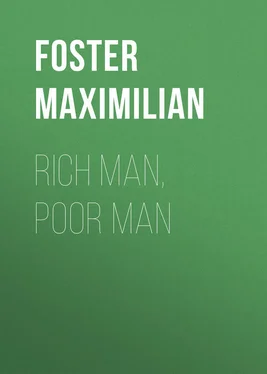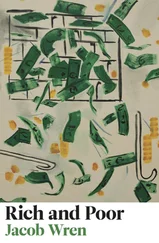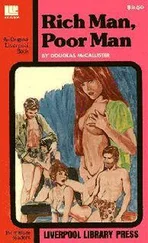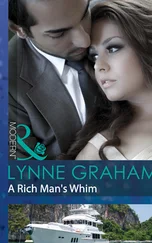Maximilian Foster - Rich Man, Poor Man
Здесь есть возможность читать онлайн «Maximilian Foster - Rich Man, Poor Man» — ознакомительный отрывок электронной книги совершенно бесплатно, а после прочтения отрывка купить полную версию. В некоторых случаях можно слушать аудио, скачать через торрент в формате fb2 и присутствует краткое содержание. Жанр: foreign_antique, foreign_prose, на английском языке. Описание произведения, (предисловие) а так же отзывы посетителей доступны на портале библиотеки ЛибКат.
- Название:Rich Man, Poor Man
- Автор:
- Жанр:
- Год:неизвестен
- ISBN:нет данных
- Рейтинг книги:5 / 5. Голосов: 1
-
Избранное:Добавить в избранное
- Отзывы:
-
Ваша оценка:
- 100
- 1
- 2
- 3
- 4
- 5
Rich Man, Poor Man: краткое содержание, описание и аннотация
Предлагаем к чтению аннотацию, описание, краткое содержание или предисловие (зависит от того, что написал сам автор книги «Rich Man, Poor Man»). Если вы не нашли необходимую информацию о книге — напишите в комментариях, мы постараемся отыскать её.
Rich Man, Poor Man — читать онлайн ознакомительный отрывок
Ниже представлен текст книги, разбитый по страницам. Система сохранения места последней прочитанной страницы, позволяет с удобством читать онлайн бесплатно книгу «Rich Man, Poor Man», без необходимости каждый раз заново искать на чём Вы остановились. Поставьте закладку, и сможете в любой момент перейти на страницу, на которой закончили чтение.
Интервал:
Закладка:
"Hush! Yes, dear, in just a little while now!"
Mrs. Tilney did not ask to have her pay in advance. A certitude, subconscious but still confident, told her the visitor hadn't it. And to have turned that woman and her child outdoors on a night like this needed more courage than Mrs. Tilney had.
"Can we stay, mother?" asked the child earnestly.
There Mrs. Tilney had grimly interposed.
"You're married, aren't you?" she demanded, with a directness as designed as it was blunt.
A startled look leaped into the visitor's eyes. Then with a quiet dignity she slipped off her glove, displaying on her finger a narrow gold band.
"I am a widow," she said.
Mrs. Tilney had asked no more.
"While you get your trunk," she directed, "you leave that child with me. Tonight's no night for her to be traipsing the street! I'll see she has her supper too. What's she eat?"
And there you are! Barbara Wynne had come to Mrs. Tilney's!
There's not much more to be told. At seven the mother returned. Then, sometime later, an express wagon left a trunk at Mrs. Tilney's door. That night Mrs. Wynne came down to her dinner; but after that, of Mrs. Tilney's guests none but Mr. Mapleson saw her ever again. Late the second night the little man pattered down the stairs and tapped at Mrs. Tilney's door.
"You'd better go up," he said; "something's happening."
Donning a dressing sack, Mrs. Tilney hurried upstairs. Half an hour later the doctor came. He gave one look at the woman moaning on her pillow – in her nightdress, her hair in braids, she seemed scarcely more than a girl – and then the doctor shrugged his shoulders.
"Pneumonia – going fast," he said.
By evening, the day after, it was all over. Steadily the lamp of life burned dimmer, fading down to darkness; yet before its light failed altogether it flickered once, gleaming momentarily. Then the watcher at the bedside saw the dulled eyes open, grow bright, and she saw the lips part and flutter.
"What is it, dearie?" whispered Mrs. Tilney.
Only an unintelligible murmur came, but of a part of it Mrs. Tilney thought she was certain.
"Babbie! Barbara Wynne!" the lips seemed to call.
Down the hall Mrs. Tilney had gone hurriedly. Mr. Mapleson's door was ajar, and there on the floor sat the little man and the child. They were cutting strings of paper dolls out of newspaper.
"Come," Mrs. Tilney had said.
That brief flicker, though, had been the last. The mother love that momentarily wrung back the passing spirit to its shell had yet not been able to hold it there. Life had fled when Mrs. Tilney got back to the room with the child.
The little girl's hand in hers, Mrs. Tilney walked from the room and shut the door behind her. Never had she looked so grim, so sharp-faced, so unlovely. Never had her bony, angular face, her slack figure and sloping shoulders seemed so unalluring. But what of that?
Not one clew to the identity of either the mother or the child was to be found among the dead woman's few possessions. The fact is her trunk contained little. Such papers as were in it comprised only half a dozen undated letters, brief notes for the most part, and none of any value. All were addressed "Dearest D," and signed either "B," "H" or "V." However, from a remark let fall by Mrs. Wynne it was inferred that she had neither friends nor family in New York. It also was inferred that she had come originally from out of town. That was all. However, the trunk delivered up one thing that, if it were of no value in identifying its owner, at least had a monetary value. This was a diamond brooch. It paid ultimately for its former owner's burial.
Bab, you understand, never left Mrs. Tilney's. The night of the mother's funeral Mr. Mapleson slipped down the hall toward Mrs. Tilney's parlor. She sat there shrouded in the dusk and crooning softly.
"Well?" asked Mr. Mapleson.
"Hush!" whispered Mrs. Tilney fiercely. Pressed tight to her flat, unlovely breast was Bab's rumpled head, and Mr. Mapleson had said no more.
For those first few years the little old man sold dictionaries for a living. It was a sordid, distressing trade. Then, too, the snubs he received were, to a man of his shy nature, each a crucifixion. Eventually, though, he was enabled to get other employment. It was as bookkeeper in the Pine Street real-estate office.
That day his joy rose to a pitch of bubbling exultation. Picking up Bab, he tossed her high.
"Diamonds and pearls! Diamonds and pearls! You'll wear 'em yet, you wait!"
But Bab Wynne was of a far more practical turn of mind.
"Did you bring me my licorice stick?" she demanded.
It was Mr. Mapleson who had first taught Bab her letters. Step by step he brought her up until it was time to send Bab to a school. Then, the school having been selected, with the child's hand in his Mr. Mapleson walked there with her every morning. At night, too, it was Mr. Mapleson who always heard her lessons. "Spell cat ," Mr. Mapleson would say; and when Bab, after deep thought, announced that c-a-t spelled cat, Mr. Mapleson would exclaim: "Very good! Very good!" and, laying down the spelling book, would pick up the reader. "Read, please," he would direct; and the little girl, bending earnestly over her book, would display to the man's breathless interest that wonderful evidence of the Creation, the marvel of a child's growing mind. "Oh, see the ox! Is the ox kind? Yes, the ox is kind."
Mr. Mapleson would be enthralled.
"Diamonds and pearls!" he'd say. "Diamonds and pearls!"
There are times, though, one fears, when Bab Wynne, with the spirit that betokens the dawning of a character, was not just so earnest, so tractable. Pouting, she'd mumble: "Don't know how to spell cat!" or, "No, I don't see the old ox!"
Mr. Mapleson would slowly shake his head.
"If you won't read and won't spell, Bab," he'd say, "how can you hope ever to grow up a lady – a fine lady?"
"Don't want to be a fine lady!" Bab would answer.
Usually after this was a little silence. Then Mr. Mapleson would hold out both his hands to her.
"D'you want to break Mr. Mapy's heart?" he'd ask.
That always fetched her. And thus had passed the years, one by one drifting by. Bab had just turned twenty, and Mr. Mapleson's promise had come true. "Diamonds and pearls! Diamonds and pearls!" he'd told her. They were to be hers now. Bab Wynne at last had found her people!
She still lay with her brown head buried among the pillows; and Mr. Mapleson, his eyes gleaming like a bird's, bent above her, quivering, his slender hand gently touching her on the cheek.
"Why, Babbie!"
She looked up suddenly, her eyes suffused.
"Oh, Mr. Mapy!" she whispered. "Is it true? Is it true?"
He had left the door open, and had one looked closely it would have been seen in the light from outside that Mr. Mapleson started first, and that then the color fled swiftly from his face.
"What do you mean?" he whispered; and rising from the pillow Bab bent closer to him, her face rapt, her lips parting with excitement.
"I mean about me," she answered, her breast heaving gently – "about everything! Last night you were talking and I heard – I couldn't help listening! You were telling about the Beestons – about them – about me! Oh, Mr. Mapy, is it true?"
Mr. Mapleson stared at her, his face like clay. He was shaking too. Then he spoke, and his voice when she heard it was thick and harshly broken. One would hardly have known it for his.
"Yes," said Mr. Mapleson, and quivered; "it's true! You're old man Beeston's granddaughter. Your father was his son." And then Mr. Mapleson said a very curious thing. "Yes – God help me!" he croaked.
Belowstairs all Mrs. Tilney's boarders sat at dinner, and in the room lit dimly by the single gas jet the two were quite alone – the white-faced, white-haired, faded little old man; the girl, youthful, lovely, alluring. But alone though they were, the whole world at that instant might have whirled about them, roaring, yet neither would have heard it.
Читать дальшеИнтервал:
Закладка:
Похожие книги на «Rich Man, Poor Man»
Представляем Вашему вниманию похожие книги на «Rich Man, Poor Man» списком для выбора. Мы отобрали схожую по названию и смыслу литературу в надежде предоставить читателям больше вариантов отыскать новые, интересные, ещё непрочитанные произведения.
Обсуждение, отзывы о книге «Rich Man, Poor Man» и просто собственные мнения читателей. Оставьте ваши комментарии, напишите, что Вы думаете о произведении, его смысле или главных героях. Укажите что конкретно понравилось, а что нет, и почему Вы так считаете.












